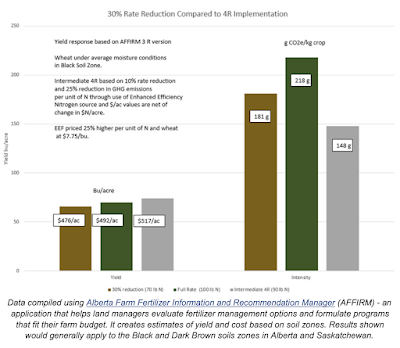While the farmers' protest in the Netherlands has received relatively little coverage in the Western dinosaur media, their plight is far from unique. Governments around the world are pledging to reduce their emissions by forcing their farmers to reduce their use of fertilizers, a move that will cut significantly into crop yields. Not surprisingly, one of the key players is Canada and its globalist lap dog, Justin Trudeau and his sidekick/leader Chrystia Freeland who have declared unilaterally that Canadian farmers will be "part of their solution" as outlined in last years "A Healthy Environment and a Healthy Economy" publication.
Here is the pledge as quoted from the publication:
"Set a national emission reduction target of 30 percent below 2020 levels from fertilizers and work with fertilizer manufacturers, farmers, provinces and territories, to develop an approach to meet it."
This absolute emissions reduction (not emissions intensity reduction) target of 30 percent is to be met by 2030, less than a decade from now. Canada's plan is based on the European Union's plan to reduce the use of fertilizers by at least 20 percent by 2030, a move which is already proving to be very, very unpopular with farmers throughout the union.
In a report prepared for Fertilizer Canada, a group which represents manufacturers, wholesalers and retailers of nitrogen, phosphate, potash and sulphur fertilizers entitled "Analysis of Potential Direct Financial Impacts on Canadian Farmers’ Fertilizer Use - Macro Analysis" prepared by MNP LLP. The report concludes the following:
"A straight-line reduction in fertilizer usage results in increased differences of actual yields versus potential yields if the status quo had been continued. By 2030, yield gaps for the three crops are estimated at 23.6 bushels per acre per year for canola, 67.9 bushels per acre per year for corn, and 36.1 per acre per year bushels per acre for spring wheat. Given constant prices, the total value of lost production grows to $10.4 billion per year by 2030."
Here is a graphic showing the impact of reduced fertilizer use on farm income:
Here is a map showing the agricultural lands that will be most impacted by the 30 percent reduction:
Revenue losses to Canadian farmers for these three crops alone will total $48.36 billion between 2023 and 2030. According to the CEO of Fertilizer Canada, Karen Proud, the federal government unilaterally made the decision on the level of cuts without consulting either provincial governments or the agricultural sector and other key stakeholders. This should come as no surprise given that the Trudeau Liberals have a history of being know it alls when it comes to just about every issue.
Fertilizer Canada has stated that farmers do not have to choose between the environment and the economy. The group's 4R Nutrient Stewardship program is the foundation for a reduction in farm emission reductions and that farmers should not have to rely on the federal government to tell them how to use fertilizers properly. Under the 4R program, farmers will follow the following four principles:
The 4R protocol results in a reduction in greenhouse gas emissions by as much as 35 percent which , if implanted across Western Canada, would reduce annual CO2e emissions of 2 to 3 megatons per year.
Here is a graphic showing how the 30 percent rate reduction in the use of fertilizers will compare to the implementation of the 4R protocol:
It is estimated that a 30 percent absolute emission reduction for a farmer with 1000 acres of canola and 1000 acres of wheat will suffer a profit loss of between $38,000 and $40,500 annually.
One might think that the Trudeau government would have taken the opportunity to address this issue at the annual meeting of Federal-Provincial-Territorial ministers of agriculture during their three day meeting in Saskatchewan held in July 2022 but such was not the case with the issue not even appearing on the agenda. Here is a press release from the Saskatchewan government about the issue:
Apparently, the Trudeau government has set the target and is intransigent about making any changes no matter how Canadian farmers may feel about the impact of the cuts in fertilizer use. It's another case of "too bad, so sad, suck it up princess" when it comes to the globalist agenda being promoted in Canada by this individual among others who are directing Canada's role in the new order at the behest of their real leader:
Given the extremely high prices of input costs for Canadian farmers during the 2022 growing season, it should come as no surprise that food inflation will be painful for consumers, a trend that will continue if the Trudeau government continues with its plans to essentially box farmers into a corner where their incomes no longer meet the cost of reduced production. Perhaps instead of picking on the agricultural sector, the Liberal ruling class should look at and reduce its own carbon footprint when it comes to gadding about the nation and the world using taxpayer-funded air and surface travel. After all, as Justine has told Canadians, we're in a "climate emergency":
But, then again, maybe the federal government's attitude toward the future of food as it relates to the unwashed masses of Canadian taxpayers explains this:
If there's one thing that Canadians have learned about the Trudeau government over the past two years it's that stubbornly clinging to flawed ideology overrules common sense.














No comments:
Post a Comment